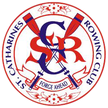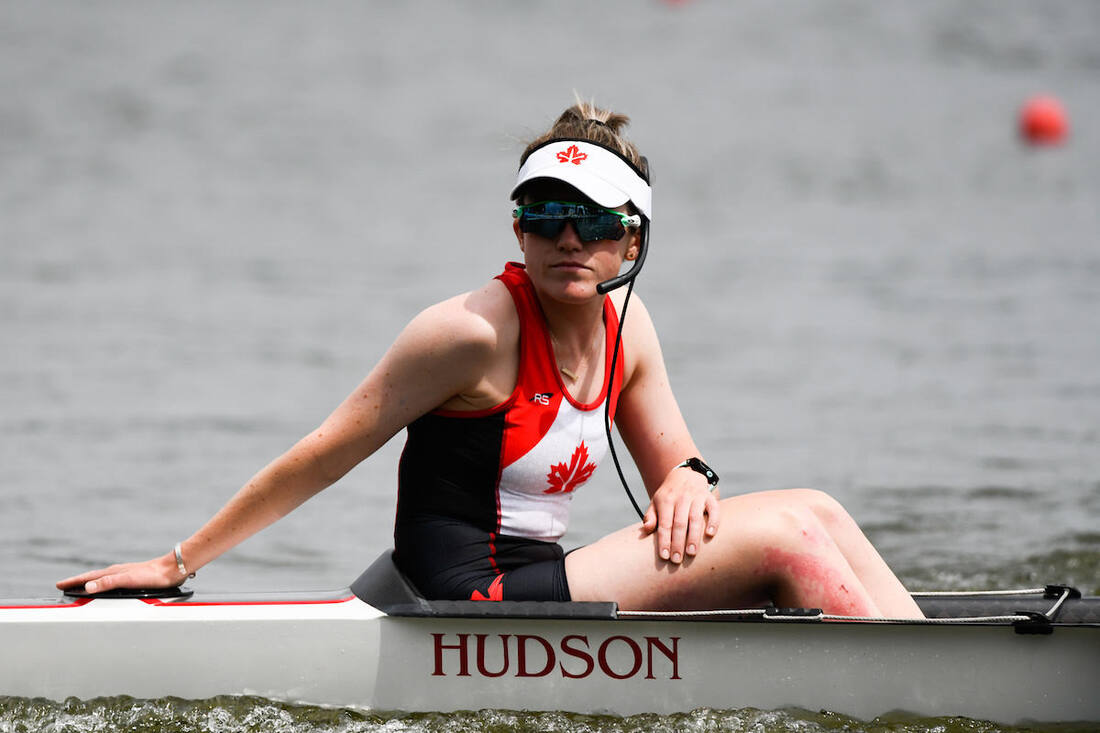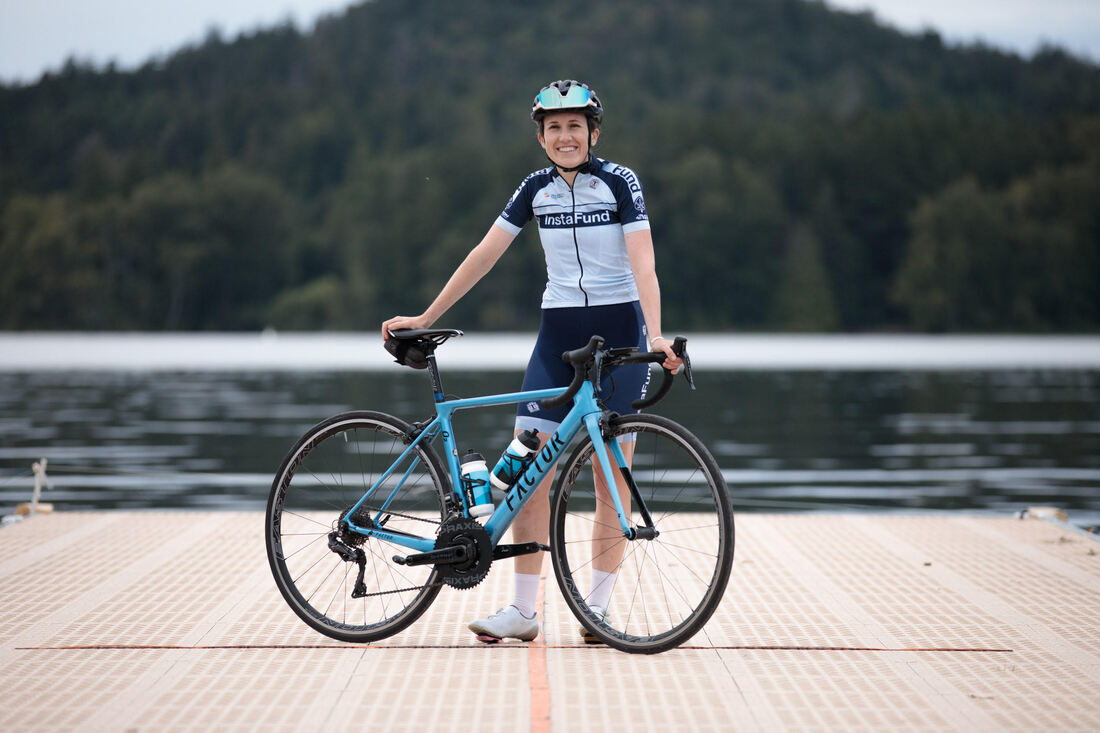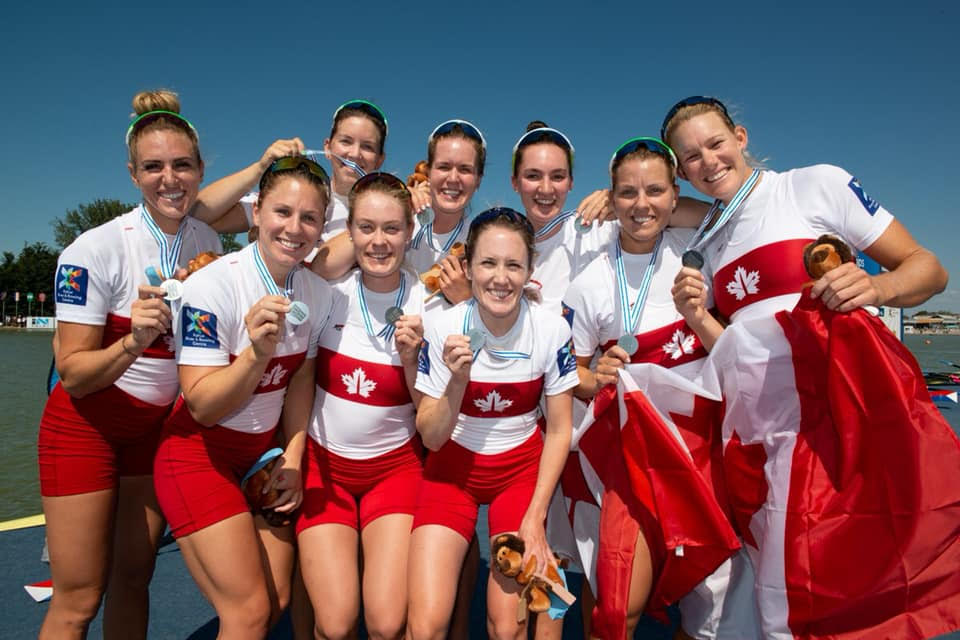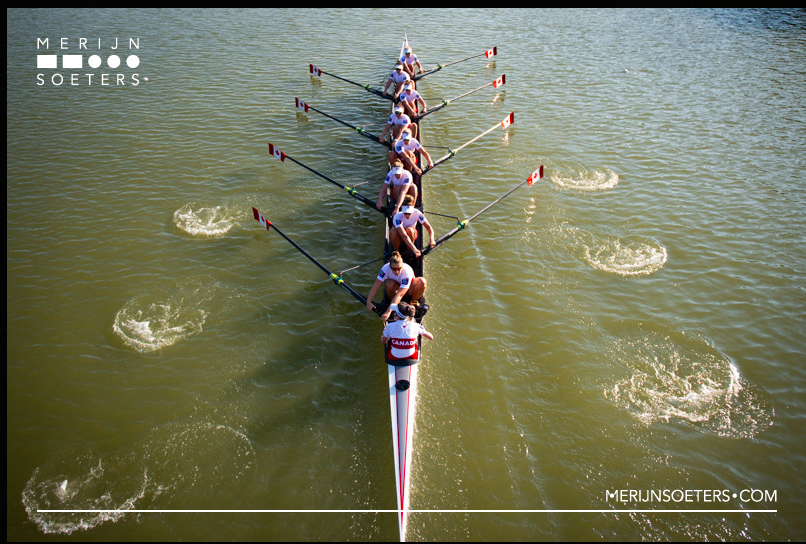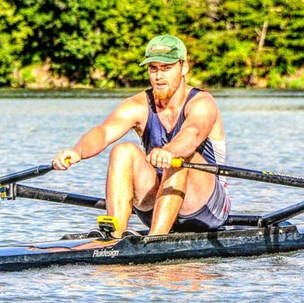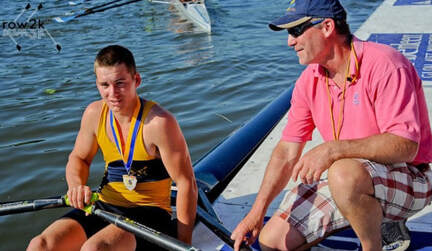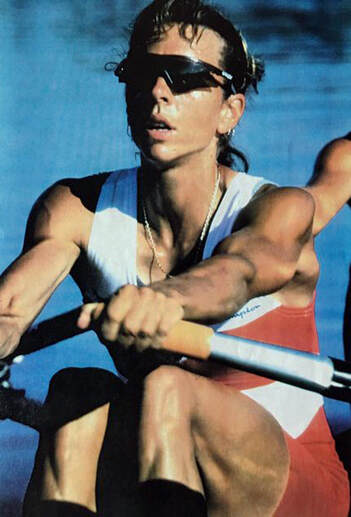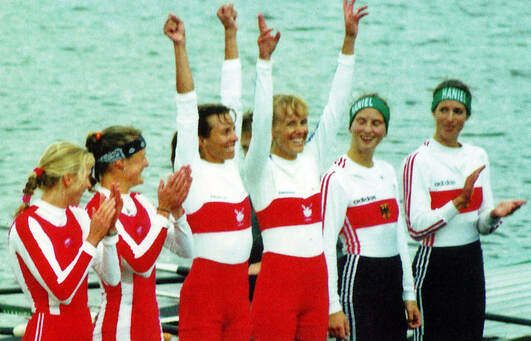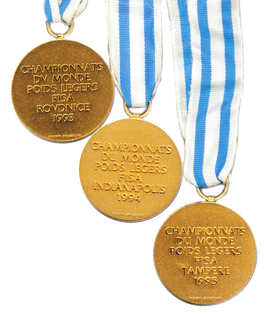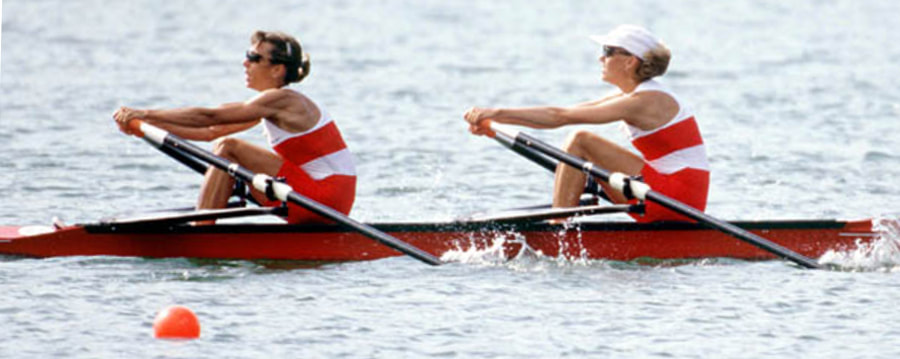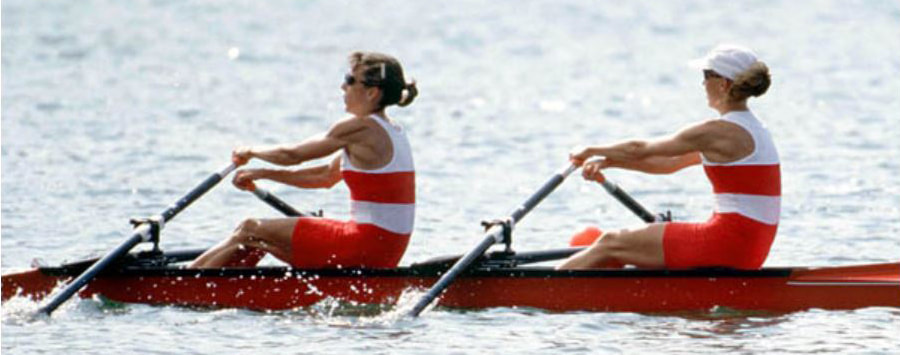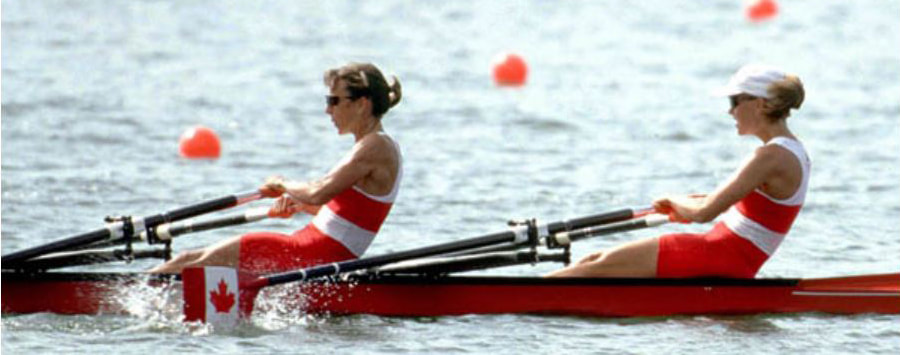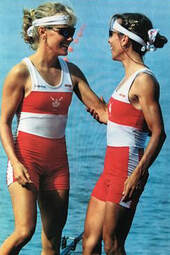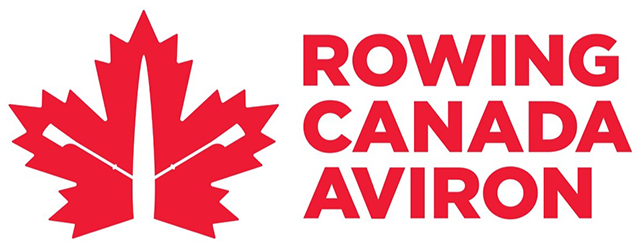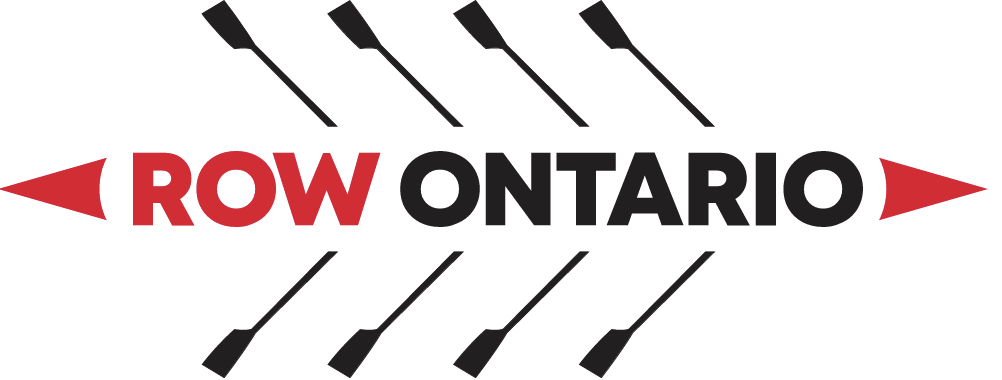The St. Catharines Rowing Club PresentsA Conversation with Kristen Kit The road to the Olympics, even for a seasoned veteran like Kit, is paved with difficulty.
LK: Could you speak about your introduction to the sport of rowing? Where does St. Catharines fit into this? KK: I went to Sir Winston Churchill (go bulldogs!), and I was a very mediocre, but competitive, cross country runner. In grade nine, the learn to row program was very popular and I knew a lot of people participating. My grandfather, John Kit, helped start the rowing program at Churchill as a teacher-advisor. He actually gave some money near the end of his life to the club for boats. I showed up to a few indoor sessions, and got lucky. I was put in a really good boat, that I was definitely under qualified to be in at the time. It was a midweight four, I believe, and three of the girls were already experienced, and Nicole Gough and I were the grade nines. We won a lot of races that year. I was really fortunate to be in that boat. I remember at the Early Bird regatta, we were in the starting gates, and I realized that I didn’t know how to steer straight! I remember saying into the mic, “girls, we gotta go, because I’m going to hit boats”. We crossed the course horizontally twice, and we still won. They were just so strong that we got ahead of everyone and it didn’t matter. I loved competition, the culture, and the camaraderie that our coach, Andrew Pilsworth built, which made me come back.
I joined the SCRC club that summer. It was so cool, I think we had seven Jr. B Women’s eights. It was really fun to see how good I could try to get. I made it into the top boat, but it was really hard and very fulfilling. We didn’t do well at Henley; in all my years of junior, we never won a medal at Henley. But it was such a neat experience. In grade 10, we did really well again, this time moving up to senior. We won everything in grade 11. The whole program did so well that year; it was an amazing group of athletes. I’m from a pretty average, middle-class family-- rowing for SWC and SCRC opened a lot of doors for me, which I am very grateful for. The first three years instilled the passion that comes and goes to be honest, and that was what made it fun. My experience of growing up and coxing in St. Catharines is what established my foundation for the sport. I think it [the culture] was a pretty special thing that the club offered me, it gave us all meaning in our daily lives. LK: Yes, we are so lucky that there are so many schools in our area that foster rowing, because that is quite rare generally speaking. KK: Absolutely, and from the funding side of things, it was fairly inexpensive for me to participate, and I don’t see that in many other places in the world. It’s pretty amazing what the club does to work with the high schools to have co-ownership with the equipment and such, because it’s making so many opportunities available for students. LK: We have met very briefly once before, at the 2017 NRCs. You knew my coach, Michele Fisher, from the national team circle, and struck up a conversation while we were practicing before the regatta. I recall that you thanked her for her advice to wear hats in the boat at the Sarasota World Championships because of the torrential downpour. Going off of that, how do you feel about rowing, and any sport really, being a constant learning process in which collaboration is crucial? KK: I’ve relied a lot on athletes and coaches to help me in the learning process. I always tell coxswains, you have to be a rowing nerd to become a good one. I have this very curious part of my brain that’s always learning what I can do to help my boat find speed. I’m really hungry to learn and do my best. I also learn a lot from my teammates. Every boat and every group has its own personality, and even if the people stay the same, the personality of the boat will change, because people change over time. So I always try to support and adapt, and try to be the best athlete I can be. I think that’s what will help me for Tokyo if we get to race. I had a bit of an up and down four years leading up to Rio. There were moments when I felt like I had the choice to either keep doing the same thing, or push myself to find new ways to discover that speed, and better support my crew. In terms of collaboration for myself, I’d love to use my experiences to help other coxswains. I mentor coxswains now, and it’s great. I genuinely believe that you can have all the information in the world, but in the moment, you still have to be able to make the right decision. It’s hard as a coxswain if you don’t have a model, so I’m happy to pay it forward. I don’t want it to be a sheltered, individual process. LK: What excites you about rowing? How do you maintain that passion in the midst of the pandemic? KK: It’s been different; we broke the day after Canada pulled out of the Olympics, and we were largely on our own in a quarantine situation until June. I race road bikes professionally, I was on a UCI, professional contract for two years with InstaFund Left Prima racing in Vancouver. That really helped me with the mental side of racing. I used to run half marathons, but then I started injuring myself, so I bought a bike. I use the bike as my training tool both for weight as well as learning how to keep a consistent wattage under the pressure of lactate! There’s a lot of carry over between cycling and rowing in terms of performance and racing. As a coxswain, I don’t really get to race that much, so the bike gets me more race starts! In the pandemic, the bike allowed me to explore and adventure in a safe way, and I still do that now that we are back training full time. It’s a great mental release. I’m choosing to not race before the Olympics because the risk of injury is not worth it. I do train 15-20 hours on the bike a week, and I try to do similar workouts to the women. It helps me to understand the mental side of consistently putting in your best effort day after day. I also had a coxswain coach, as well as a variety of Olympic medallist coxswains mentor me in the last year. I’m always trying new things to stay sharp. In rowing we can plan for everything but something can still happen, be it equipment malfunctions, weather conditions, or extraneous circumstances. So I try to amass as many tools in my toolbox as I can (an idea my old UBC coach, Craig Pond, put in my head). Outside of rowing, I’m working on my undergrad. I also work part time at a financial startup doing research (Collective2Financial). My first U23s was in 2009, so I’ve been pretty focused on rowing for a long time. This will be my third Games if Tokyo happens and it’s really good to have a focus outside of rowing, because when things are going well, it’s such a rush, but when things may not be going as well, it can be really low. So it’s great to have something outside of rowing to balance it all out. It’s also important to be honest about how difficult it is right now. Everyone is struggling in this very crazy time. I’m seeing a lot of positive content out there on social media, but it’s also important to acknowledge that these are hard times. Many coxswains especially haven’t been in a boat in such a long time. LK: Absolutely. But if I’ve learned anything in the last year that if you hit a major roadblock in training, it doesn’t mean you’re done for as an athlete. Obviously you need to keep training, but with situations like this, your athletic career isn’t over. I certainly struggled with that when everything closed up in thinking that it would be so difficult to recover from this, but as athletes, we are resilient and can make a triumphant return. KK: Yes, just make the most of what you have and move forward.
LK: What lessons have you learned from rowing that are also applicable to other aspects of your life? KK: The big two that I like to share are: The first is, ‘why not me?’ Someone has to fill the seat, so why not you? I’m not from a sporty, or extremely affluent family (I’ve noticed rowing is still a very wealthy sport in many areas of the world). My family worked really hard to get me these opportunities. There are a lot of reasons why you can’t do something, but ultimately, why not you? There is always a way for you to be able to do something if you really want it, or at least be able to create a silver lining out of the situation you may find yourself The second is that I make a lot of mistakes, and I fail a lot, but I still show up. I’m a perfectionist, and I’ve had to work on over the years. I’ve realized, I don’t have to be perfect, I just have to do my best. Failure is not failure if you refuse to let it remain so. I think SCRC is a special place for rowing, and we all have to actively work to keep it like that. I have a faint memory of when Jean Chretien came to St. Catharines for the 1999 Worlds. I didn’t even know what rowing was at the time, but I have this strong feeling of hometown pride from that event. It’s exciting to think that a new generation is going to experience that in this decade. There’s the mega Worlds in 2024, and the Canada Games in 2022. These are amazing events and the more people that are engaged that aren’t directly tied to the club, the better. Mayor Walter Sendzyk is doing such a great job, and I hope the club continues in this positive direction. I wouldn’t be here if it wasn’t for the St. Catharines Rowing Club and Sir Winston Churchill, they did so much for me. AuthorLauren Kelly is a junior at the University of Notre Dame, where she competes on the rowing team and majors in history and Irish studies. A long time member of the St. Catharines Rowing Club, she recently stepped into the role of social media coordinator for the club. St. Catharines Rowing Club Presents
LK: Your dad obviously played a huge role in your rowing career, how did that relationship evolve from novice rowing when you were 11 years old, to now? MF: When I was younger, I wasn’t the fittest person. I had played minor football, and I did the summer learn to row program. I didn’t like it all, I much preferred football. Rowing was just a summer activity. My dad made me do it for one year, and then that summer season, I won a race or two, and in grade 10 I started to develop it a bit more. He was my coach all through high school, and he really just built me into who I am today.
it that far, because everyone around me had been sculling for years at that point. I remember I got in the starting gates, on the Schuylkill river, where the first part of the race is on an angle, and once you get through the bridge, maybe 200m into the race, you really learn who’s in the lead at that point. So I had the same strategy: I was at a 38, 40 rate, just ticking along, and I came through the bridge and I was in the lead! So I had to keep building the lead. By about 1000m in, my legs were totally shot. My parents were in the grandstands, and my brother’s supposed to be recording, but he was too excited and forgot to actually start recording. My dad’s not even looking at the course, he’s just beside himself. And then he looks up and sees me in podium contention! When I get to the 1000m I know I have to turn it up, but I can’t really, I’m just exhausted. The lead starts to close, and first place blows past me, second place just beats me, I beat fourth, by like .15, but then right after I crossed the finish line, I flipped! No one cared about the first or second, because they were all so concerned about me. So that was really the start of my sculling career, and kind of how I built my focus on rate in the rowing world, which is kind of how I’ve excelled. But my dad was definitely the building block of my rowing, and then I just had to tweak it on my own. He’s always checking in on me. LK: That Stotes competition must have been such a wild day for you, with the semis in the morning and that final in the afternoon. MF: Oh, yea for sure, plus the drive home that night! And my brother forgot to record the race, and that’s the one race I’d love to see again. Did you ever race in Philly? LK: I raced at Stotes twice in high school, but only once on the Schuylkill, and it totally messes with your head when you’re heading into the bridge. I was closest to one of the bridge abutments, so I truly had no idea where I was at that point in the race. But I suppose that what makes everyone just get out of the gates as quickly as they can, and race with blinders on for the first half. How special was it to have your dad so closely tied to your rowing career, as opposed to the typical parent-athlete style of staying in the grandstands? MF: My parents have been incredible. Rowing, you obviously don’t get much funding, and when I was out west (with the national team), they were personally funding me. When I went to U23’s in Italy the first time, they generously funded me to go to that. And it was such an exciting time, it was a little last minute, and I was just so excited. And at the grandstands in Italy, I was sitting there watching the practices go by, and I hear, “Finley! Matt Finley!” and it’s my mom and dad. They came! They didn’t tell me! They’ve been to Bulgaria, the Netherlands, Peru, everywhere to support me. LK: Given your experiences both with SCRC and Brock University, what does Henley Island mean to you? MF: Well, it’s home. If I go to any other course, it’s just not St. Catharines. I can still just think about calm days in St. Catharines, just chilling in my single. That’s my home course, and I wish I could train there all year long, but unfortunately here, there’s wintertime and when the wind kicks up, you hate that course so much. But when it’s nice weather, and the water’s calm, it’s the best place to be. LK: It is too bad that we can’t row all year round, because the permanent dock is so tempting. Of course we can’t row right now with the lockdown, but in early December I was out on the water with a group and we ran onto some ice! Luckily it was quite thin, so there wasn’t any damage, but that certainly is an advantage for our club to have the option to row all year round. MF: There does get to a point when you’re rowing that it’s so cold and it’s not enjoyable. When I was out west there were days when it didn’t feel helpful to be in the cold. But what’s so nice about here is that there is a whole winter season to do cross training and it just gives you a breath.
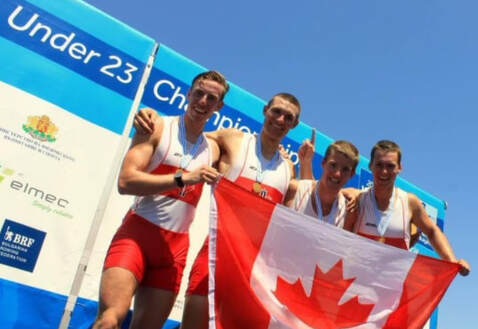 LK: With three U23 World Championships experience, and the gold in the 2015 quad, you were certainly quite successful. I saw on your bio for Brock University that you consider anyone to win a Worlds as your role model. What did that mean to you to join those ranks? MF: It was a huge accomplishment at the time. In 2014, we were inexperienced, and we came 4th in the semi-final, so winning the next year was really exciting. But in regards to role models, it’s always cool to see Canada excel. When we won, it honestly just felt like a job well done and I think the more you race, the more it’s kind of the same. If I were to race for SCRC in the single, or for Canada in the single, it’s still the same race. You have the same process and intention. But, I don’t know, if what I’ve done inspires people to be better, to be active, then that’s great. LK: Well speaking of inspiring people, could you talk about your recent 100k erg you completed for your friend, Nick? MF: The idea for that kind of came from my new interest in running, that was really forced by the pandemic. I had done a few marathons, a few half marathons, and then I had the crazy idea to do a 100k run, so I ran from the Service Road, all the way to Toronto. My right knee was really acting up in the last 5k, so I had to walk a bit of the last 5k, but I did it. So that was my big accomplishment for running, and then shortly after, my buddy unfortunately had a stroke. We went to primary school together, and I wanted to do something to help him recover faster. So when thinking of what to do a fundraiser for him. I wasn’t going to run again, but I realized that the erg was the next goal. So I got permission from his family to do a 100k erg, and I didn’t really train for the piece, the longest I had been on the erg for recently was about 30k, and before that all I had been doing was short pieces. So we broadcasted the piece on Facebook and Instagram, my mom was my little nutritionist, she kept bringing me fruit. We had a lot of people come over, cheering me on, spraying water on me! But the goal was just to raise money for him, and he’s recovering extremely fast! I always post updates about him, he took a swing at a golf club the other day, and he’s making a quicker recovery than most expected. It was just something I could do to help a friend out. LK: It’s such an incredible thing to do, especially for a friend. We’ll attach the link to the GoFundMe to this article in the event that anyone wishes to donate. Between that erg, and the 100k run you did earlier that month, what motivates you to complete these extreme athlete challenges, and how do they compare to a typical rowing event? What did you do to occupy your mind in the middle of those long pieces? MF: They were definitely some dark times in the middle of those pieces. When I was doing the erg, we had some movies playing, but after a while, I lost interest in that and watched some Olympic races, and then in the final 10k, I had a bunch of buddies over and that got me through it. But when I was 60k in, that was pretty dark. Interestingly, that was the same spot that was the toughest in both the run and the erg. 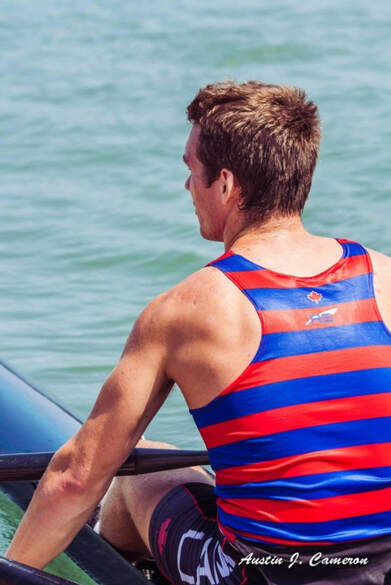 LK: What did you prefer, the run or the erg? MF: Mentally, the erg messed me up more. Physically the run was more difficult, and probably because I didn’t really train for the run. The longest I had run before that was 42k, which was triggered off of people telling me I couldn’t run 100k. And I was just motivated to prove them wrong! But the erg was mentally much tougher. Although physically, I think I was just so used to the form, and rowing stroke, that it didn’t bother me as much, I’ve just up and down that slide so many times. But I did, unexpectedly get these blood blisters under the nails but they didn’t really come in until after I finished the piece. The hydration was also pretty tough to get through. LK: Is there anything else, other than proving nay-sayers wrong, that motivates you to complete these ultra athletic events? MF: It’s also to prove to myself that I can do it, but being a bit removed from the rowing world, I just want to keep doing things that excite me. The first day of quarantine last year, I did my first marathon, when before that I had only ever done 14k at the most. But after that, I just kept wanting to beat my times. And just looking at people excelling online, that’s also very motivating. LK: Do you see yourself going back on the water soon, once the lockdown is over? MF: Oh yea! If there’s a racing season this summer, coming up, I’ll definitely be out there. I haven’t done much on the erg recently in terms of shorter distances, lots of low rates. I’ll do 500m at a 20, and see how that goes. Or a 2k at a 20, and then a 2k at a 30 and compare them. But I do feel like I’m in the best cardio and strength shape I’ve ever been at. But I’m just excited to see what I can do. LK: What lessons have you learned from rowing that you have carried into other areas of your life? MF: Teamwork, for sure. I try to show up on time the best I can; work ethic. Sometimes I’ll be doing labour jobs, and when other people are tired, or want to stop, I just keep going. But definitely teamwork and believing in your team. The time management, I’m still working on, but work ethic, and believing in the people around you is something rowing instilled me. AuthorLauren Kelly is a junior at the University of Notre Dame, where she competes on the rowing team and majors in history and Irish studies. A long time member of the St. Catharines Rowing Club, she recently stepped into the role of social media coordinator for the club. St. Catharines Rowing Club presents A Conversation with Wendy Wiebe
LK: It seems as though it took little time for your rowing career to be headed in the right direction, with your four gold medals at CSSRA. While you were obviously successful early on, what were the biggest motivating factors in your decision to pursue international competition? WW: It was just little steps that continued to open doors. The biggest thing about rowing is that you can measure your success by how training is going; not always how racing is going because it depends on how everyone else is doing with that, but it just kind of happened by accident, at the beginning at least. With history too, when I started rowing, Canada was not a rowing powerhouse. These things happened step by step over time. When I started rowing with the National Team, the goal was to make the final. It didn’t even feel like it was in the realm of possibility to win when I started. But that all kind of happened over time. So really, it was just a process that had to be taken step by step. I trained mostly with boys: Dave Boyes, Peter Somerwil, and we all fed off each other. There were plans at the end of my career, but it felt like it just kind of happened by chance. You know what it’s like, you get to the end of the season and think you’re never doing it again and then you’re right back at it a month again. I was in the right era too, because in 1984, the lightweight women had an exhibition race at the Worlds, and then it was ushered in more permanently after that. I started sculling after I got married, and then the opportunity for the Olympics added another three years to the schedule. So really, it was just a lot of luck and being surrounded by good people. LK: It’s really interesting, because of everyone I have spoken with, no one said they were intent on going to the Olympics, but rather, that they took care of all the little things, and it fell into place, and your statement really just reaffirmed that sentiment! What was your experience with the St. Catharines Rowing Club? WW: I had a great time. The last five years of my competitive career I wasn’t training very much at St. Catharines, but it has, and will, always be home. I always say you can take the girl out of St. Catharines, but you can’t take the St. Catharines out of the girl; it’s home to me. I just have amazing memories of rowing in the summer there, we just had so much fun. It was what I wanted to do every summer. SCRC holds a very special place in my heart. I just started up there again after 10 or 15 years, and it doesn’t feel like I ever left. LK: It really is such a special place. I always find that when I come home from university, I feel the emotional reconnection when I see my family, but when I drive down Main Street in Port Dalhousie, that’s when I feel like I’m geographically home. How did rowing play a part in your post-secondary education and career? WW: I rowed at University of Western, in the heavyweight boat, but I was always a lightweight. When I finished university, I kept rowing. I was always a sweeper. I came back to St. Catharines and got married the year I graduated. But at the time, if you didn’t own a single, then you didn’t scull. I was having trouble finding people to row with, so in ‘87, I rowed in the lightweight four. When I came back, I didn’t have anyone to row with, so I bought a single to keep training in, while I was working full time and married. I had to borrow money from my dad to buy the single, I had never sculled before, and my husband pushed me off the dock and I was bawling! I started training with the St. Catharines group and went from there. After 3 years, in 1990, I started rowing in the double. In 1992, I quit my full time job to row full time. We won a bronze at ‘93 Worlds, and that was when I started to leave home more and train with the National Team LK: To continue off of that, what was the process like for you with the National Team, given the numerous times you dominated the podium? WW: I did start working full time from 87-92, and around that time, Mike Spracklen came in and reinvented rowing in Canada at the highest level. I was only doing 2 sessions a day, by myself; I resisted doing 3 times a day because I was working, I was married, but I kept coming in third place. At that time, there were rumblings that a lightweight double was going to happen for the Worlds, and so I thought that if I was going to do it, I had to fully pursue it and stop making excuses. So I relocated, and started training with the National Team. I finally gave in, and it was the right decision, it made all the difference. That summer was when we won our first world championship. I had to put my career on hold, but that’s ok, it was the right thing to do for me. The national team is really the same thing as club, at its barest of examinations. You’re jumping through hoops and doing what they tell you to do. One of the reasons Canada became so successful because of the incredibly competitive training environment. It would be everyone, all in singles, just going up and down the course everyday, really doing a “battle paddle”. Twice a week, we would have rated pieces; I think on Wednesdays would be a 5k piece, and they would compare it with the Gold Medal Standard. So we would know who the fastest one on the team was every week. If you were having a bad day, someone who was having a good day would drag you along. It was an awesome, grueling atmosphere. Images from The St. Catharines Rowing Club: 100 Years in a Row, Stan Lapinski LK: I’m sure you learned so many lessons that are applicable to outside life in that environment. WW: Absolutely, you learn how to work with people, what to do when you get shot down. How to win and lose with grace. That’s what I find so upsetting about this era of COVID, how many people we have lost. Not even at the national team, but the grade nine’s, the grade 12’s, they’ve lost such great times in their lives for competition. It’s a very sad time for rowing. LK: In the 1996 Olympic Games, you came down with a terrible flu virus the week before the race, and still managed to finish seventh. What did that experience teach you? What did you do to pull yourself through that race? WW: That was awful. But I didn’t know if it was nerves, or what leading up to the event. Truly a terrible experience, it felt like I was rowing through mud. To be at your best and to lose is one thing, but to not be able to perform at your best is something else. But, through that, though, I learned that the same people that loved me when I was going fast still loved me when I wasn’t. I had great teammates. I got emails from people from all different times of my life demonstrating support. It was also the end of my career. So not only was I done rowing, but it wasn’t a great ending to that time in my life. But I think that things happen for a reason; I learned that the people who I surrounded myself with demonstrated that they were in my corner no matter what. Wendy Wiebe and Colleen Miller at the 1996 Olympics in Atlanta. (CP PHOTOS/ COA/ Claus Andersen)
LK: What do you make of your legacy as one of the most decorated rowers in Canadian history?
AuthorLauren Kelly is a junior at the University of Notre Dame, where she competes on the rowing team and majors in history and Irish studies. A long time member of the St. Catharines Rowing Club, she recently stepped into the role of social media coordinator for the club. |
St. Catharines Rowing ClubThe St. Catharines Rowing Club has a long tradition of competing at the highest level in the sport of rowing. Categories
All
Archives
November 2023
|
Please Support Our Sponsors
SIGNATURE
PLATINUM
GOLD
SILVER
BRONZE
© 2014, St. Catharines Rowing Club
St. Catharines Rowing Club, P.O. Box 28010, 600 Ontario St., St. Catharines, ON, L2N 7P8.
St. Catharines Rowing Club, P.O. Box 28010, 600 Ontario St., St. Catharines, ON, L2N 7P8.
